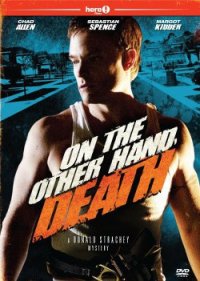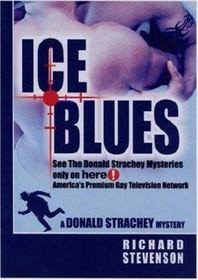Strachey's Folly - Stevenson Richard (читать книги онлайн регистрации .TXT) 📗
My card is in the wallet." At this, Mrs. Krumfutz, I thought, flinched.
"If the laws of New York are anything like the laws of the Commonwealth of Pennsylvania, I don't think you're licensed to trespass," the cop said. "Now turn around slowly and look at me."
I turned and faced a big, ruddy-faced youth with clear blue eyes and a name tag that read "Patrolman Lewis Henderson Jr."
"What you and I are going to do now, Donald, is we're going to walk out to my patrol car—you walking ahead of me— and you're going to get into the backseat, and you're going to sit down there while I shut the door. Do you understand that, Donald?"
"Yep."
"Just a minute," Mrs. Krumfutz said, and walked closer to the cop and me without ever quite joining either of us. "Let's just have a look at that license of yours, Mr. Donald-the-Private-Investigator."
As the cop held open my wallet, Mrs. Krumfutz came closer to him and squinted at it briefly. She said to me, "Donald Stra-chey. Why, I think I know just who you are."
"Oh?"
"Who is he?" the cop said.
"Horse," she said, forcing a tight grin, "I think this might be all right."
"Oh, yeah?"
"Could I speak to Donald privately for just a second? This may be just a teeny-tiny bit personal. If you know what I mean," she added, and let loose with an outburst that was half cough and half cackle.
Officer Henderson didn't seem to like the way all this was heading. Clearly, the correct procedure here was to lock me in the cruiser while he ran my name through the computer. But, owing to her celebrity status—not just as a pro-life, pro-gun former congresswoman but as a pro-life, pro-gun former congress-woman who had been involved in a scandal that had gripped the Susquehanna valley at six and eleven for many weeks—Mrs. Krumfutz was a woman whose wishes could reasonably be viewed as something akin to authoritative and would thus supplant any normal routine.
Henderson said, "He's not armed. If you'd like to step inside, I'll stand by. Holler if you need help."
"Thanks, Horse." Mrs. Krumfutz gestured for me to follow her.
We went into the house and she shut the door behind us. Instead of remaining near the door, she led me across the kitchen, through another door, and into the garage. A dim overhead light went on automatically.
I said, "You don't want us to be within earshot of Officer Henderson. Is that right?"
"Yes," she hissed, and her black eyes bore into me. "All right, Mr. Peeping Tom, you can spit it out right now. Are you working for Nelson?"
"I am unable to identify my client, Mrs. Krumfutz. I'm sorry."
"Maybe you'll be able to identify your client," she said evenly, "if I go get my Walther PK-38 and threaten to blow your face off. Would that make a difference?"
She talked like an NRA fund-raising letter, and I'd run into gun people before and knew they could be dangerous. Also, I wasn't sure there weren't two Mexican hit men somewhere in the house. I looked at Mrs. Krumfutz and wondered if I should make a break for it out the front while she was still unarmed and before Luis and Hector appeared. The problem was, the cop knew my name and had my car ID—in fact, he was still holding my wallet.
Mrs. Krumfutz said, "Cat got your tongue, dog's breath?"
Recklessly I said, "I saw you."
She went white. Then suddenly her color returned with a rush, and she snapped, "I don't give a hoot! It doesn't make a bit of difference. I've got plenty on Nelson. I know it and he knows it!"
"What have you got?"
"I've still got my scrapbook, and Nelson knows I've got it. If that man messes with me, believe you me, I'll put him in the hoosegow for the rest of his life. Just don't tempt me, Donald. You tell him that. Just don't tempt Betty, tell him. And if anything happens to me—if they find my body dumped on the Log Heaven levee some fine morning—that's it. It all goes to the prosecutors, the whole kit and caboodle. Friends of mine have their definite instructions."
"You seem to have made thorough arrangements, Mrs. Krumfutz. I'm impressed. You're quite a force to be reckoned with. Tell me more."
"I'll tell you not one more blessed thing. Now get out of my house and out of Log Heaven, and take your filth with you!"
"My filth?"
"You tracked mud through my kitchen! I'd make you stay and mop it up, but I'm sick to death of you and everything you and my husband represent, and I want you out of here now. I'll fix it with Horse Henderson. I just want you out of my house!"
"I'll be happy to go, but I want you to understand one thing, Mrs. Krumfutz, and understand it clearly. If you unleash your Mexican paid killers, and if anything happens to Jim Suter— anything at all, now or in the distant future—I will expose you. You'll pay. You'll go down the rest of the way. All the rest of the way. Do you understand me?"
She stood there looking baffled. "Hit men? My Lord, is that what Nelson thinks? Don't be silly. And Jim Suter? You mean Jim Suter the writer?"
"Who else?"
"Donald, I don't know what in the Sam Hill you're even talking about. One of us must be crazy as a loon. What's Jim Suter got to do with it?"
Chapter 10
Mrs. Krumfutz just snickered at the idea of Mexican paid killers, and she found it preposterous that Jim Suter had any connection at all to her husband's criminal activity, the exact nature of which I could not get her to specify. I thought her repeated references to "my scrapbook" referred to additional records she had kept on the campaign-finance scam, but I wasn't sure of it, and as she began to sense how little I actually knew about her husband's activities, she grew even cagier and less forthcoming on that subject. Nor did Jim Suter seem to have anything to do with whatever it was that had gone on in Mrs. Krumfutz's house that night and which I pretended to have witnessed but hadn't actually. I had only just seen two people kneeling side by side, or so it seemed.
Moreover, Mrs. Krumfutz denied visiting the AIDS quilt the day before and having fled in fear from Jim Suter's panel. Nor could she imagine why anyone would sew a section of her campaign biography on an AIDS quilt panel.
"Is Jim dead from AIDS?" she gasped. "But you just talked as if he's alive."
"He is alive, but he's in danger."
"What do you mean? How do you know?"
How much could I tell her? It had all gotten too confusing. Was she putting on an act? This was possible. Here was a woman who had been elected to Congress with the backing of the pious religious right, yet in private she connived like and spoke in the language of an Albany Democratic-machine ward healer, circa 1935.
Taking no chances, I said, "Jim may be in trouble, but I don't know where he is or exactly what the problem is. On behalf of a mutual friend, I'm watching out for him and his interests."
Now she looked perplexed all over again. "Nelson is taking an interest in Jim Suter? That's hard to believe. Nelson always called Jim 'that fairy writer.' Jim's a homosexual, you know." "I know."
"As far as I was concerned, Jim being a homo was up to him. I hired him to write literature for my congressional campaign."
"Uh-huh."
"Homosexuals always end up in trouble." "Where were you yesterday afternoon," I asked, "if you weren't at the AIDS quilt?"
"That is none of your concern. None whatsoever." "Three people saw you at the quilt."




